Federico Esu: the architect of connections rebuilding Sardinia | Olianas
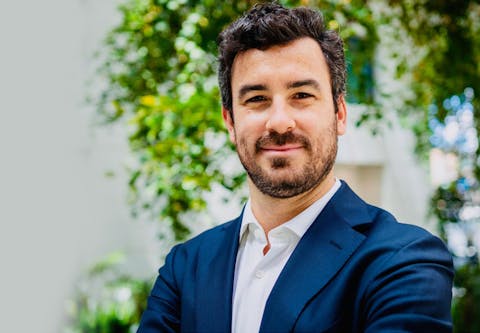
People
Federico Esu: the architect of connections rebuilding Sardinia
by Jessica Cani
Federico Esu embodies the bridge he has always dreamed of building: half Sardinian, half Sicilian, raised in a Carbonia that was already, in itself, a laboratory of cultural exchanges. From this dual heritage—the grandfather, a shepherd from Barbusi, and the Sicilian grandparents who chose the island as their home—he developed a perspective capable of embracing different worlds and reconnecting them.
Born in Iglesias and raised in Carbonia, Federico breathed in from childhood the essence of a land with mixed roots. “Carbonia was the perfect melting pot: no traditional costume, no ‘our’ dish, but an incredible cultural mix,” he recalls. This blend of identities shaped his worldview and his ability to seize opportunities beyond borders.
His roots lie in two complementary terrains. His paternal side connected him to deep Sardinia: “My grandparents from Barbusi spoke Sardinian, my playground was an entire mountain; rabbits, chickens, Uncle Silvano, as everyone called him. As a boy from Carbonia, I was enchanted by that agro-pastoral world.” His maternal side, instead, told him about mobility: “My Sicilian grandparents arrived in their twenties, even spent some time in Turin working for Fiat, then chose to return here because the island had become home.”
From this dual perspective arose his drive to explore. After high school, he moved to Cagliari and chose Law, drawn to international law. “The borders of Carbonia weren’t enough; I felt I didn’t yet have the tools to realize the ideas in my head,” he admits. Legal practice at the Cagliari Bar made him realize that wearing the robe was not his destiny. “I realized what I truly loved were languages and different cultures. Leaving wasn’t an act of escape, but pure curiosity—with a touch of creative anger: I wanted to see what else was out there for me, beyond the island.”
The Erasmus in Glasgow became his first opening to a wider world, followed by a master’s in London thanks to the Master and Back scholarship.
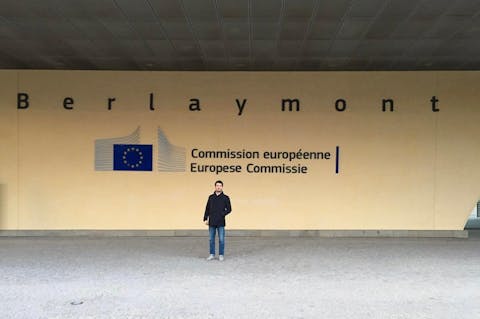
For Federico, Brussels was less a city than a professional opportunity: “I arrived because I wanted the European Commission: for me, Brussels was about work, not the city.” Eight and a half years at the heart of European institutions became a laboratory to refine skills and vision.
From legal expert, he evolved into a project manager, leading agreements on innovation and technology, but he felt the need for a more solid theoretical framework. He thus embarked on an evening MBA at Bocconi, regularly flying between Brussels and Milan—a commute that, paradoxically, reconnected him with Italy and sparked thoughts of a possible return.
The pandemic accelerated this reflection, turning Brussels into an unrecognizable city: “The pandemic swept away my points of reference: friends left, Thursday dinners disappeared, coworking spaces closed.” The “expat bubble” that once seemed adventurous now felt like a suspended aquarium, distant from a true community.
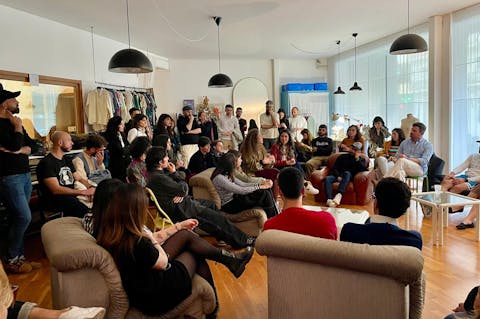
It was during the lockdown that Itaca was born, a handcrafted project that would become the compass for his return. “What tool do I have, here and now, to bring people together? A podcast,” Federico asked himself, confined in his Belgian apartment. With an entry-level microphone and a sheet hung as a sound absorber, he began recording conversations that went beyond résumés.
The first voice was that of a friend he had met in London: “It’s the perfect story: starts as a dishwasher, studies at night, today runs a department at Lloyd’s.” Federico wasn’t looking for famous talents, but people willing to share their stories authentically. As the interview project evolved, he realized a crucial perspective was missing: “We lacked the lens of those returning. So I shifted to dialogues between those who leave and those who stay.” Bridge episodes were born, connecting worlds that seemed far apart.
The podcast revealed unexpected power: listeners began reaching out to each other, exchanging contacts, creating a spontaneous network of mutual support. “At one point, I found myself managing a WhatsApp chat with 70 names from Vancouver to Villacidro: they were sharing contacts, grants, even rental opportunities.” Itaca proved that it wasn’t just storytelling, but a platform for emotional and professional solidarity.
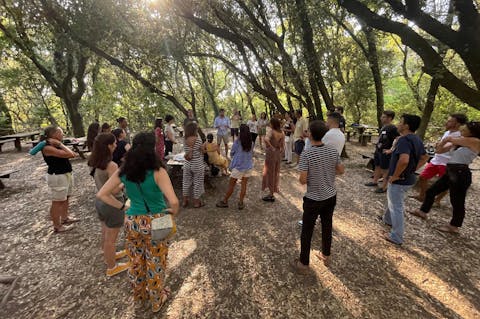
The trust that Itaca’s participants placed in him convinced Federico that the project was more than just a podcast—it was a social mending operation. “These conversations have the power to repair a fabric in Sardinia that has frayed because we stopped talking,” he observes.
His decision to return to Sardinia also emerged from these conversations, though not immediately. During an interview with a new employer, Federico asked if he could come back to Italy. The response was quick: “Perfect, we have an office in Bologna.” He then replied: “Bologna is wonderful, but I would like to do it from Sardinia.” A brief moment of surprise on the other end, then openness: “We can find a way.”
The choice matured in private discussions with Sophie, his Belgian partner: weeks of deliberation—“Do we stay in Brussels? Go to Madrid, maybe Switzerland?”—until, almost in unison, the right question arose: “Why not Cagliari? There’s a wave of returnees and projects taking off here.”
Today, Federico smiles recalling it: “The tools I lacked at twenty, I have now. And I realized I don’t need to have all the ingredients myself: it’s enough to have the right people to create alchemy. If it works, it will be extraordinary; if it doesn’t, at least we tried at the perfect time.”
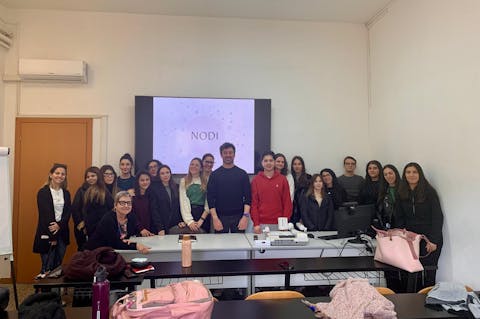
Federico’s return to Sardinia at the end of 2023 unleashed extraordinary energy. “In eighteen months, I accomplished more projects than in the previous five years,” he recounts. From this momentum, Nodi was born, an umbrella project bringing together several initiatives: the Itaca podcast, traveling workshops, school meetings, and a mentoring program.
“Sardinia doesn’t need yet another ‘returning genius’; it needs connections,” he asserts. His contribution focuses on linking people and ideas, seeing situations from above, and turning even a simple aperitif into a potential catalyst for cultural change.
Federico speaks about responsibility with clarity: “If you’ve had the privilege to leave, study, and return with new skills, you must put them at the service of the community.” This belief translates into a mentoring program where experts become “older siblings” for those seeking guidance, offering questions rather than prepackaged answers.
Nodi’s vision is ambitious yet pragmatic: “The goal is to make Sardinia count on the same scale as Milan or London.” Today, Federico observes, a well-paid opportunity outside the island is often worth ten times a bet in Sardinia. Nodi works to rebalance this disparity so that leaving or staying becomes a free choice, not a necessity.
Early results are already visible—for instance, a group of “little knots” who had only met online spent an entire Sunday in London discussing projects for Sardinia. It’s proof that the network works and that connections generate further connections.
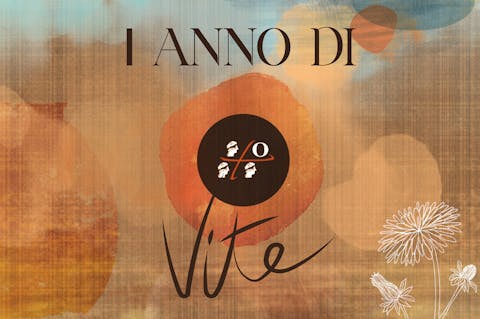
With Federico Esu’s story, we reach the first year of Vite: twelve appointments for twelve faces, each in their own way reshaping the island. It’s no coincidence that he is the last guest, as he is helping us design the very first Vite event.
To celebrate this first year of storytelling, we have chosen to return to the origins, among the vineyards of Tenuta Olianas.
On Saturday, May 24, coinciding with Cantine Aperte, Tenuta Olianas, Jessica Cani—the mind behind Vite and a connector in the food and wine sector—and Federico Esu, for his role as a talent connector on the island, will bring together some of the guests interviewed over the course of the project, alongside new voices.
Event details will follow soon, but one thing you can do already: mark the date in your calendar. On May 24, we’ll toast together to a year of Vite and to the connections that continue to grow: conversation, drinks, food, and shared moments.
